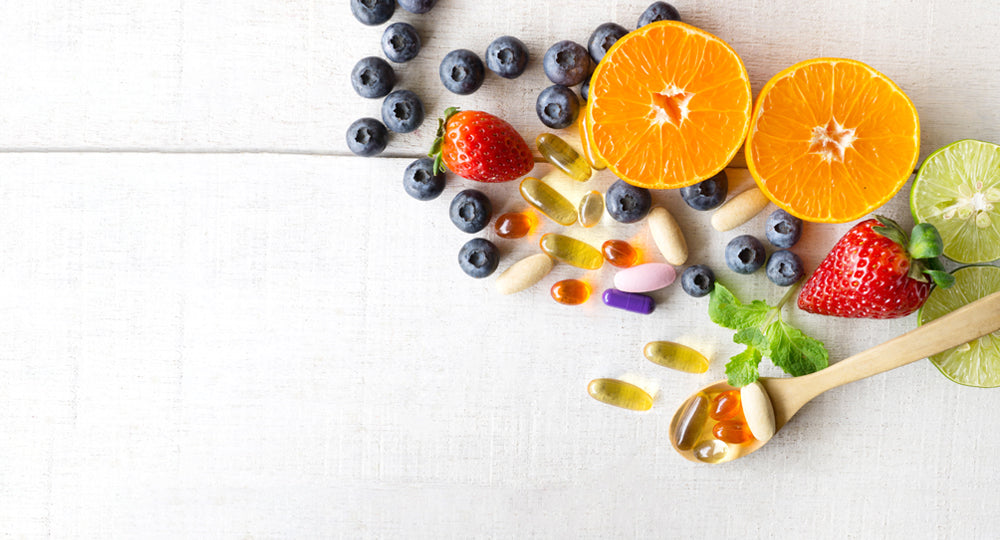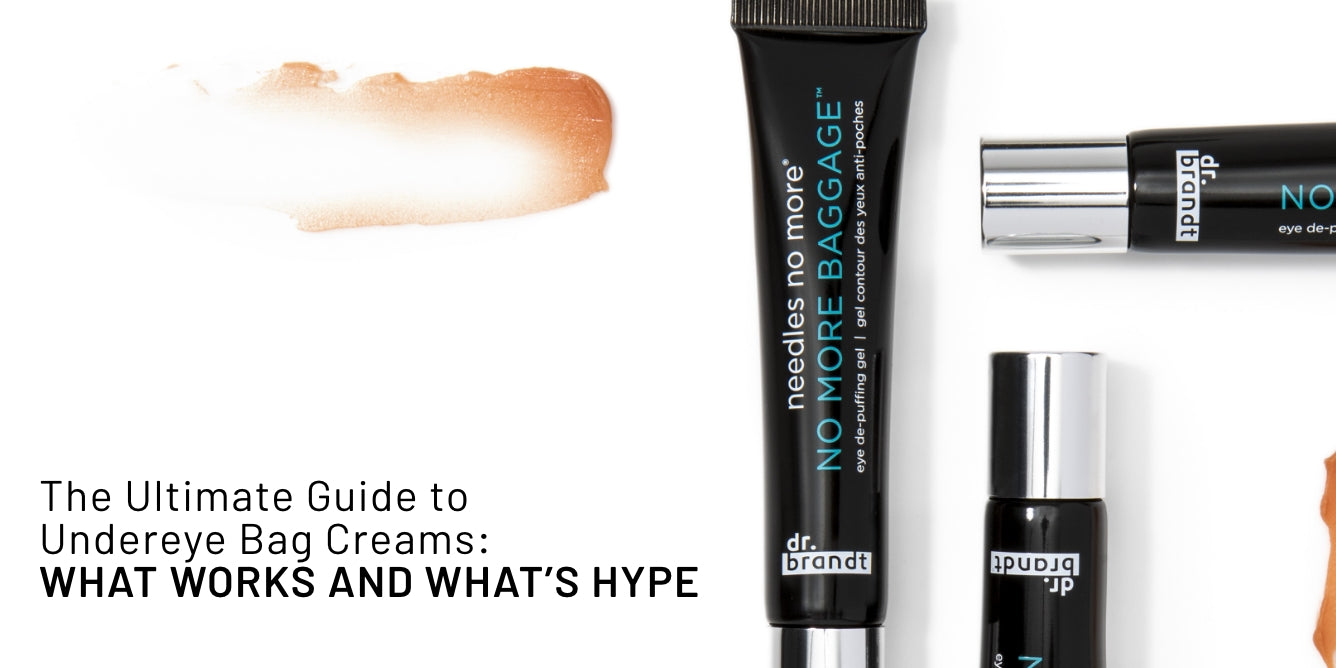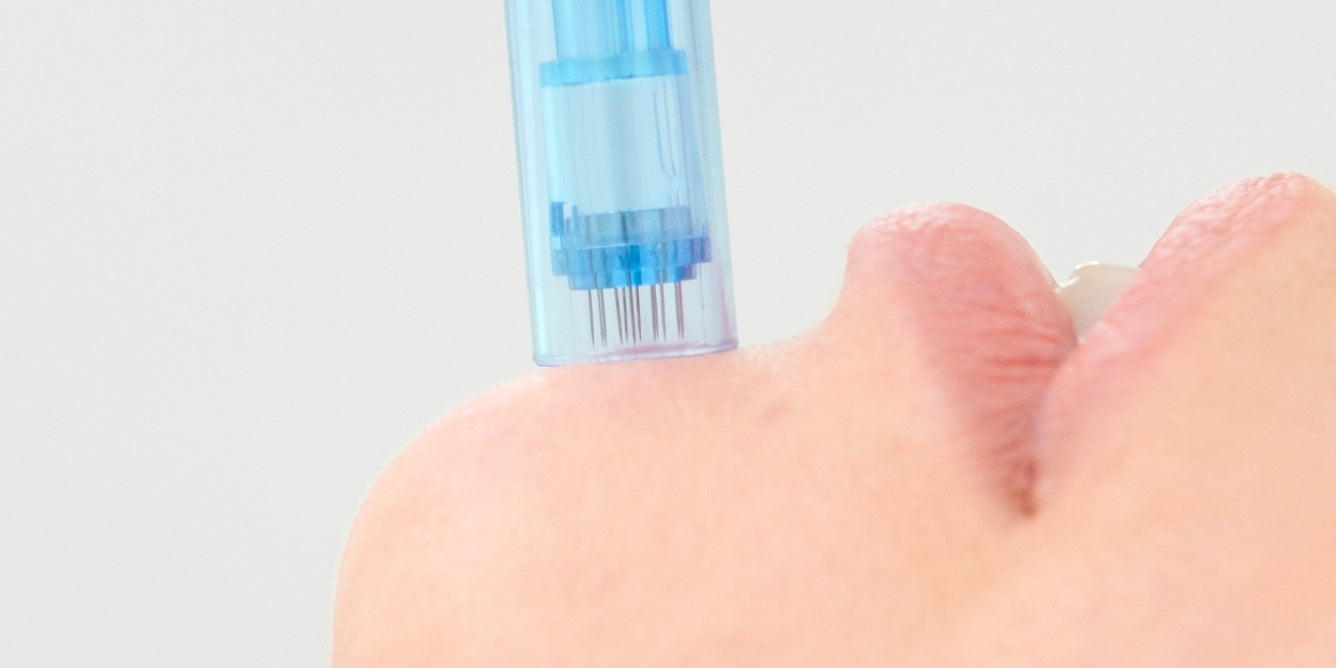
Let’s start at the basics: Vitamins are organic compounds that are meaningful to our bodies to function properly. Humans cannot properly create vitamins on our own; we either need to ingest them through specific foods or for vitamin D, for example, by being in the sun, which is a great source for this nutrient. In the beauty and skincare industry, vitamins have been a growing trend as they have shown to have a good impact on health.
There are 13 recognized vitamins to this day, and all serve a specific purpose in improving each body function.
Why are vitamins essential for skin health?
With skin being the human body’s biggest organ, vitamins play an important role to keep it healthy, whether ingested (through food or supplements) or applied on skin. Vitamins can be found in different types of food and all serve a different purpose for the human body. Let’s take a look at 7 of these vitamins and how they interact with our skin:

Vitamin C
Vitamin C, also known as L-ascorbic acid, is water soluble. It is naturally produced in some foods (fruits and vegetables, mostly) such as:
- Citrus fruits (orange, kiwi, lemon, grapefruit)
- Peppers (red bell peppers)
- Strawberries
- Blackcurrants
- Broccoli
- Brussels sprouts
- Potatoes
Unlike most animals, humans aren’t capable of synthesizing this vitamin endogenously. It is essential for the biosynthesis of collagen (which helps wounds to heal) and a few neurotransmitters. Known as a powerful physiological antioxidant, it can help regenerate other antioxidants in the body such as Vitamin E. One of the main defenders against oxidative stress and free radicals, it may play an important role in preventing damage or delaying certain illnesses such as cancer or cardiovascular diseases.
Many skincare brands formulate products like vitamin C-infused face serums, creams or moisturizers as it helps encourage skin’s natural production of collagen to keep the skin young and prevent fine lines and wrinkles. It is also very useful to protect the skin from damaging exposure such as UV rays (UVA or UVB), pollution, and free radicals.
Our new brightening serum C Scription™ uses the gold standard of vitamin C, which is THD Ascorbate at 20%, one of the highest on the market, known to be the best form of vitamin C for all skin types.
Vitamin E
Vitamin E is the collective name for a group of fat-soluble compounds with distinct antioxidant benefits. It is also involved in the immune function. It has other benefits such as helping prevent coronary diseases, inflammation and can help promote eye health.
Alpha tocopherol is the only form that meets human requirements.
Like Vitamin C, it is found naturally in foods and in dietary supplements such as:
- Sunflower oil and seeds
- Almonds
- Peanuts and peanut butter
- Pumpkin
- Red bell pepper
- Collard greens and spinach
Vitamin E is a powerful antioxidant and has important attributes in protecting skin against free-radicals. Applied topically, it can nourish the skin and protect it from UV rays.
Vitamin A
Vitamin A is a fat-soluble vitamin found naturally in foods and in dietary supplements. Like all vitamins, it has several benefits for your body and your skin health. It is important for healthy vision, the immune system, and reproduction. It also helps the heart, kidneys and lungs function properly.
There are two types of vitamin A; the first one, known as “preformed vitamin A” (retinols), is naturally in meat, poultry and dairy products. The second type, called “provitamin A” (carotenoids) is found in fruits, vegetables and other plant-based products. The most common type of provitamin A used is beta-carotene.
Vitamin A can also be applied topically to improve skin health and prevent certain skin conditions, the most common one being acne thanks to its anti-inflammatory benefits.
Skincare creams using Vitamin A can help brighten skin, improve our glow and help reduce dark spots caused by the sun.
Vitamin D
Vitamin D also known as “calciferol” is a fat-soluble vitamin found in some foods added together and in dietary supplements. It can also be endogenously produced from UV rays on the skin, triggering Vitamin D synthesis.
It is biologically inert and needs to go through 2 hydroxylations in the body in order to be activated:
- In the liver, where it converts into “calcidiol”
- In the kidney, where it converts into “calcitriol”
Foods that contain Vitamin D are:
- Fatty fish such as tuna, mackerel and salmon
- Dairy products
- Orange juice
- Soy milk
- Cereals
- Beef liver
- Cheese
- Egg yolks
- Mushrooms
Vitamin D’s many benefits are to help regulate the amount of calcium and phosphate in your body which are key to keeping bones, teeth and muscles healthy. It is also known to help stimulate hair follicles to grow. Often called the 'sunshine vitamin', vitamin D plays an integral role in skin protection and rejuvenation (helping shed dead skin cells and encouraging new ones). In its active form as calcitriol, it contributes to skin cell growth, repair, and metabolism. It can be applied topically with an oil on skin to prevent skin flares.
Vitamin K
Vitamin K is a fat-soluble vitamin that is found naturally in some foods and in some dietary supplements. These vitamins play a key role in blood clotting, bone metabolism and regulating blood calcium levels.
It is found in the following foods:
- Green leafy veggies such as kale, spinach, collard greens, swiss chards and mustard greens
- Vegetables such as brussels sprouts, broccoli, cauliflower and cabbage
- Fish
- Liver
- Meat
- Eggs
- Cereals
Vitamin K can also be helpful in treating skin conditions such as stretch marks and spider veins. As its main purpose is to prevent blood clotting, it can help the body heal wounds, bruises and areas that have undergone surgery.
Vitamin B
This vitamin is considered a good health and wellness vitamin. It is known to promote:
cell health, growth of red blood cells, energy levels, good eyesight, healthy brain function, good digestion, healthy appetite and a proper nerve function. It can be found in most daily foods and dietary supplements:
- Leafy greens
- Eggs
- Milk
- Beef
- Oysters, clams, mussels
- Salmon
Applied topically, vitamin B-3 or “niacinamide” can help diminish the appearance of skin aging and reduce the look of fine lines and wrinkles.
Vitamin F
Vitamin F isn’t a vitamin in its traditional sense, it represents two fats:
- alpha-linolenic acid (ALA) - member of the omega-3 fat family
- linoleic acid (LA) - member of the omega-6 fat family
This vitamin supplies calories, provides cell structure and is involved in blood pressure regulation and immune function. It can be found naturally in foods and in supplements such as:
- Avocados
- Meat
- Fish (salmon, trout, mackerel, tuna)
- Spirulina
- Sprouts
- Flaxseed oil
It is a great option against eczema and psoriasis; with its anti-inflammatory and moisturizing benefits, it is considered gentle and effective for these skin issues. It is generally safe for all skin types.
Other nutrients that are essential for a healthy skin
The body needs many things to function in its best form, even though vitamins are very helpful and important, other nutrients can help take care of our skin. A few to keep in mind are:
-Zinc:
Acquired through diet or applied topically, zinc can be very useful in helping promote skin’s natural collagen production to prevent fine lines, wrinkles and other aging issues. It can be found in eggs, seafood, turkey and whole grains.
-Hyaluronic Acid:
Created in your body, hyaluronic acid helps maintain skin hydration, but it also lubricates joints so that your knees, elbows and toes move properly.
This acid can hold up to 1,0000 times its weight of water, which helps the skin stay moisturized for smooth looking skin.

-Green Tea:
It is a rich source of polyphenol, known to help eliminate cancer-causing free radicals from your body. It plays an important role in reducing inflammation and protecting cell membranes.

Vitamins are essential nutrients that your body needs in order to function, so it’s intuitive to ensure that your skin is also receiving the proper vitamins. Making sure you’re nourishing your body with healthy foods and keeping up with a healthy diet is the first step, but adding vitamin-infused skincare products can help protect skin and prevent signs of aging, keeping it looking and feeling healthier, longer.
https://ods.od.nih.gov/factsheets/VitaminC-HealthProfessional/
https://ods.od.nih.gov/factsheets/VitaminD-HealthProfessional/




Leave a comment (all fields required)